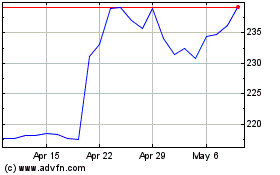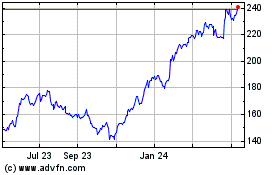A Better Way to Pay Off Credit-Card Debt -- Journal Report
October 21 2018 - 10:36PM
Dow Jones News
By Grant E. Donnelly and Michael Norton
For most Americans not able to pay off a credit-card balance,
the most common choice at bill-paying time is to pay the minimum
balance -- an approach that keeps them treading water while the
amount they owe increases.
We propose a different choice: Pay off specific purchases each
month, such as a coffee from Starbucks, a pair of shoes or a gift
for a friend, which then disappear from the bill. It may be a small
amount, but it reduces the individual's debt incrementally, in
bite-size portions that they can actually afford.
Nearly half of all U.S. households report holding unsecured debt
from credit cards; for 2017 the Board of Governors of the Federal
Reserve put the national balance of revolving credit card debt at a
little over $1 trillion. Repayment-by-purchase offers individuals a
way to make progress toward reducing their debt instead of being
paralyzed by the mass of what they owe.
We conducted a study with our colleagues Cait Lamberton at the
University of Pittsburgh and Zoë Chance at the Yale School of
Management, in which we gave cardholders a menu of payment options,
including repayment-by-purchase. Those who maintain a revolving
balance on their credit card each month and those who are
delinquent in repaying their credit-card bills showed the largest
response to our intervention. (Consumers who regularly pay their
credit-card balance in full each month continued to do so.)
Consumers paid upward of 15% more toward their debt when allowed
to scan their statement and target specific purchases for
repayment. Why does this work? Because it reduces the feeling that
a statement is an endless sea of debts. It leads consumers to feel
as if they are making real progress toward reducing their debt with
each purchase paid off.
It was also interesting to us that in choosing what purchases to
pay for, people put essentials like groceries and utility bills
before nonessentials like vacations, alcohol and dining out. This
suggests to us that people feel more uncomfortable carrying a
balance for basic living expenses than they do for extraordinary
purchases. Previous research suggested that people would feel more
inclined to pay off vacations because it's hard to enjoy a vacation
you haven't paid for, whereas for durables like a washer-and-dryer
combo it would feel all right to owe a debt because you enjoy the
purchase over time. Our finding suggests that when picking among
many items, people are drawn to the things they need vs. the things
they wanted.
Repayment-by-purchase is a low-cost, practical intervention that
changes consumers' relationship to their debt. In fact, American
Express now offers the ability to do just this through their online
services: large purchases are flagged with a "Plan It" option, but
smaller purchases are flagged with a "Pay It" option -- allowing
consumers to experience the kinds of small wins that our research
suggests can help them reduce their debt.
Dr. Donnelly is an assistant professor of marketing at Ohio
State University Dr. Norton is a professor at Harvard Business
School. Email: reports@wsj.com.
(END) Dow Jones Newswires
October 21, 2018 22:21 ET (02:21 GMT)
Copyright (c) 2018 Dow Jones & Company, Inc.
American Express (NYSE:AXP)
Historical Stock Chart
From Aug 2024 to Sep 2024

American Express (NYSE:AXP)
Historical Stock Chart
From Sep 2023 to Sep 2024
